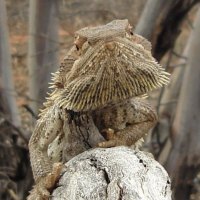Australia’s central bearded dragon has developed a very interesting way of fine tuning its use of solar power.
Reptiles are cold blooded creatures that rely on their environment for warmth. They bask in the sun during the day to help provide them with the energy they need. Like humans, reptiles also get their daily dose of vitamin D from the sun.
The central bearded dragon has a bit of an edge over other reptiles in how it uses the sun. As well as courtship and camouflage; it changes its colour throughout the day to regulate its temperature.
The dragon is a dark brown after sunrise and for much of the morning. This decreases its skin reflectivity; which helps the lizard heat up. During the hottest part of the day a dragon’s skin turns a significantly lighter colour; increasing reflectivity to assist in preventing overheating. It will remain the lighter shade overnight.
A new study has also found this colour change occurs in sync with the dragon’s circadian rhythm – even if kept in complete darkness for 24 hours, the colour change will still occur at specific times of the day.
Bearded Dragon Trivia
There are 8 species of bearded dragon. The smallest is Pogona Microlepidota (Small-scaled bearded dragon) which grows 10 to 15cm. The largest species are Pogona Vitticeps (central or inland bearded dragon) and Pogona Barbata (Eastern bearded dragon); both of which grow to around 60cm long.
A popular reptile pet*, bearded dragons can live to 12 – 14 years in captivity.
Bearded dragons are omnivorous – they eat vertebrates, invertebrates and plant matter. A sticky tongue helps them ‘reel in’ their prey.
While generally a placid creature, they can bite and do produce a mild venom. However, the venom is harmless to humans and just about all animals. It’s assumed it’s a leftover trait from a time when the dragon used venom in hunting.
When threatened, the bearded dragon uses bluff. It will face the threat with its with mouth open wide, hissing and beard puffed out to make it seem larger. The “spikes” on its beard will appear rigid (and sharp); discouraging aggressors. The lizard will often stand its ground which isn’t always such a good thing; particularly if a vehicle is the threat.
* It is illegal in all states to take a wild bearded dragon and keep it as a pet (as is the case with most, if not all, native Australian reptiles). Pet dragons must be purchased from licensed breeders. A permit to keep a dragon may also be required.
Our professional solar installers in Melbourne will assess and determine your energy needs. We customise a solar panel system in Melbourne to fit the roof size of your property, ensuring you receive the most suitable solar panel system for your Melbourne home, meeting to property’s energy requirements.












































